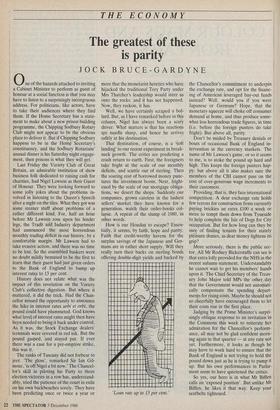THE ECONOMY
The greatest of these is parity
JOCK BRUCE-GARDYNE
Last Friday the Variety Club of Great Britain, an admirable institution of show business folk dedicated.to raising cash for charities, had Nigel Lawson as their Guest of Honour. They were looking forward to some jolly jokes about the problems in- volved in listening to the Queen's Speech after a night on the tiles. What they got was some sterner stuff about problems of a rather different kind. For, half an hour before Mr Lawsqn rose upon his hinder legs, the Trade and Industry department had announced the most horrendous monthly trading deficit in our history, by a comfortable margin. Mr Lawson had to take evasive action, and there was no time to be lost. So the assembled buskers were no doubt mildly bemused to be the first to learn that their guest had just given orders to the Bank of England to bump up interest rates to 13 per cent.
History does not relate what was the impact of this revelation on the Variety Club's collective digestion. But where it mattered, it did the trick. Had the Chan- cellor missed the opportunity to announce the hike .in interest rates urbi et orbi, the pound could have plummeted. God knows what level of interest rates might then have been needed to bring it back under control. As it was, the Stock Exchange dealers' terminals were covered in red ink. But the pound gasped, and stayed put. If ever there was a case for a pre-emptive strike, this was it.
The ranks of Tuscany did not forbear to jeer. 'The gloss', remarked Sir Ian Gil- mour, 'is off Nigel a bit now.' The Chancel- lor's skill in piloting his Party to three election victories in a row has, understand- ably, tried the patience of the court in exile on his own backbenches sorely. They have been predicting once or twice a year or more that the monetarist heretics who have hijacked the traditional Tory Party under Mrs Thatcher's leadership would steer us onto the rocks: and it has not happened. Now, they reckon, it has.
Well, we have certainly scraped a bol- lard. But, as 1 have remarked before in this column, Nigel has always been a scary driver. What matters is that his reactions are needle sharp, and hence he arrives safely at his destination.
That destination, of course, is a 'Soft landing' to our recent experiment in break- neck growth. The critics are predicting a crash return to earth. First, the foreigners take fright at the scale of our monthly deficits, and scuttle out of sterling. Then the soaring cost of borrowed money punc- tures the investment boom. Next, fright- ened by the scale of our mortgage obliga- tions, we desert the shops. Suddenly our companies, grown careless in the lushest sellers' market they have known for a generation, watch their order-books col- lapse. A repeat of the slump of 1980, in other words.
How is our Houdini to escape? Essen- tially, it seems, by faith, hope and parity. Faith that credit-worthy havens for the surplus savings of the Japanese and Ger- mans are in rather short supply. Will they really turn their backs on sterling bonds offenng double-digit yields and backed by 'Loan rate up to 13 per cent.' the Chancellor's commitment to underpin the exchange rate, and opt for the financ- ing of American leveraged buy-out funds instead? Well, would you if you were Japanese or Germans? Hope, that the monetary squeeze will choke off consumer demand at home, and thus produce some- what less horrendous trade figures, in time (i.e. before the foreign punters do take fright). But above all, parity.
Don't be misled by Treasury denials or bouts of occasional Bank of England in- tervention in the currency markets. The name of Mr Lawson's game, or so it seems to me, is to stoke the pound up hard and high. This keeps the foreign punters hap- py: but above all it also makes sure the members of the CBI cannot pass on the cost of over-generous wage increments to their customers.
Providing, that is, they face international competition. A dear exchange rate holds few terrors for construction firms currently paying brickies an extra 000 a week or more to tempt them down from Tyneside to help complete the Isle of Dogs for City occupation. But for how long can they be sure of finding tenants for their stately pleasure domes, as dear money tightens its grip?
More seriously, there is the public sec- tor. All Mr Rodney Bickerstaffe can see is that extra lolly provided for the NHS in the recent autumn statement. Understandably he cannot wait to get his members' hands upon it. The Chief Secretary of the Treas- ury John Major told MPs the other day that the Government would not automati- cally compensate the spending depart- ments for rising costs. Maybe he should not so cheerfully have encouraged them to let their costs rise in the first place.
Judging by the Prime Minister's surpri- singly oblique response to an invitation in the Commons this week to reiterate her admiration for the Chancellor's perform- ance, all may not be glad confident morn- ing again In that quarter — at any rate not yet. Furthermore, it looks as though he may have to work hard to ensure that the Bank of England is not trying to hold the pound down just as he is trying to pump it up But his own performances in Parlia- ment seem to have quietened the critics.
So yes, our hero is in what Mr Biffen calls an 'exposed position'. But unlike Mr Biller', he likes it that way. Keep your seatbelts tightened.


































































 Previous page
Previous page